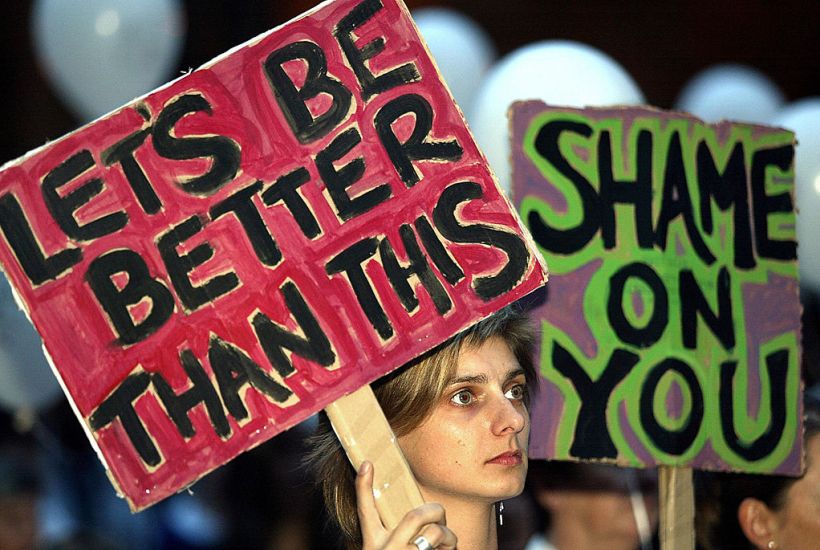The internet was imagined by its pioneers to be the arbiter of a new information renaissance, believing that it would revolutionise the way we learn and communicate. Instead, it has devolved into a platform for individuals to build their social currencies through virtue signalling and social justice stunts while it continually strips us of our attention spans.
Technological progress enabled by free market capitalism and preservation of individual liberty through the rule of law has endowed us with standards of living and comfort that are unimaginable even by our recent ancestors just a few generations ago. Yet the young of today are increasingly sensitive. They would rather seek out frivolous pursuits to build their repertoire of social credit and perpetuate intellectual infancy, instead of spending precious time genuinely bettering humanity.
Take for example the vegan protest that occurred outside the Antler Kitchen and Bar restaurant that occurred in Toronto. Like immature high school bullies, these social justice warriors pick on victims they perceive as weak and voiceless – like small business owners – in order to gain media attention and social credit. To their irony, the harassment prompted a response from the restaurant owner, Michael Hunter, who carved and ate an animal leg in front of them, winning him international support and recognition. However, not all business owners have been as lucky as Hunter.
On Valentine’s day, two vegan protestors took to harassing a lone farmer in rural Western Australia by loitering outside his property, taking photos and videos of his cattle. When they were instructed to kindly leave, they remained adamant about staying which resulted in a minor scuffle. The media did not take it too kindly to the actions of the farmer, painting him as the aggressor and even offering an exclusive interview to the vegan activist.
Less than two weeks later, the same militant vegan activist was arrested for trespassing into a pork farm to film the alleged “mistreatment of animals”.
The potency of virtue signalling is so irresistible that even a West Australian MP, Lisa Baker, has claimed that meat-eating men were responsible for more greenhouse gas emissions than vegan women and food production industries such as farming are responsible for climate change in a speech in the House. The Member for Maylands – increasingly gentrified, but still with a side of old labour grunge to have with the almond milk latte – even took to social media to state that governments are responsible for the lifestyle choices of individuals and proposals like “meat free Mondays” are good steps forward.
It is cause for real shame that the internet has become a place for the intellectually lazy social justice warriors to proliferate and push their inane sense of virtue onto others.
As Ludwig Von Mises wrote succinctly more than 50 years ago before social justice was such a thing:
This search for a scapegoat is an attitude of people living under the social order which treats everybody according to his contribution to the well being of his fellow men and where thus everybody is the founder of his own fortune.
The problem is further exacerbated by ever decreasing attention spans that reorientates society to take on bite-size and easily digestible information, reinforcing a culture for short time preference and instant gratification.
This is because the diversion of attention to check on the validity of the information is difficult and costly in terms of time and the benefits of echoing deceptively intuitive views reaps greater social benefits for the individual as opposed to offering a contrarian viewpoint.
Too much of the internet – and its child, social media – has become nothing but a platform for individuals to gain social credit through virtue signalling and an enthusiasm for the most risible claims to social justice in order for them to indulge their own vanity.
It is therefore imperative that we as a society recognise the insidiousness of this behaviour if we wish to preserve the tradition of knowledge, learning and human progress.
It has already captured the Millennials. Who’s next?
Wesley Goh holds an Economics and Finance degree from the University of Western Australia and is currently a research associate at the Australian Taxpayer’s Alliance and a Mannkal scholar.
Got something to add? Join the discussion and comment below.
Got something to add? Join the discussion and comment below.
Get 10 issues for just $10
Subscribe to The Spectator Australia today for the next 10 magazine issues, plus full online access, for just $10.


























Comments
Don't miss out
Join the conversation with other Spectator Australia readers. Subscribe to leave a comment.
SUBSCRIBEAlready a subscriber? Log in